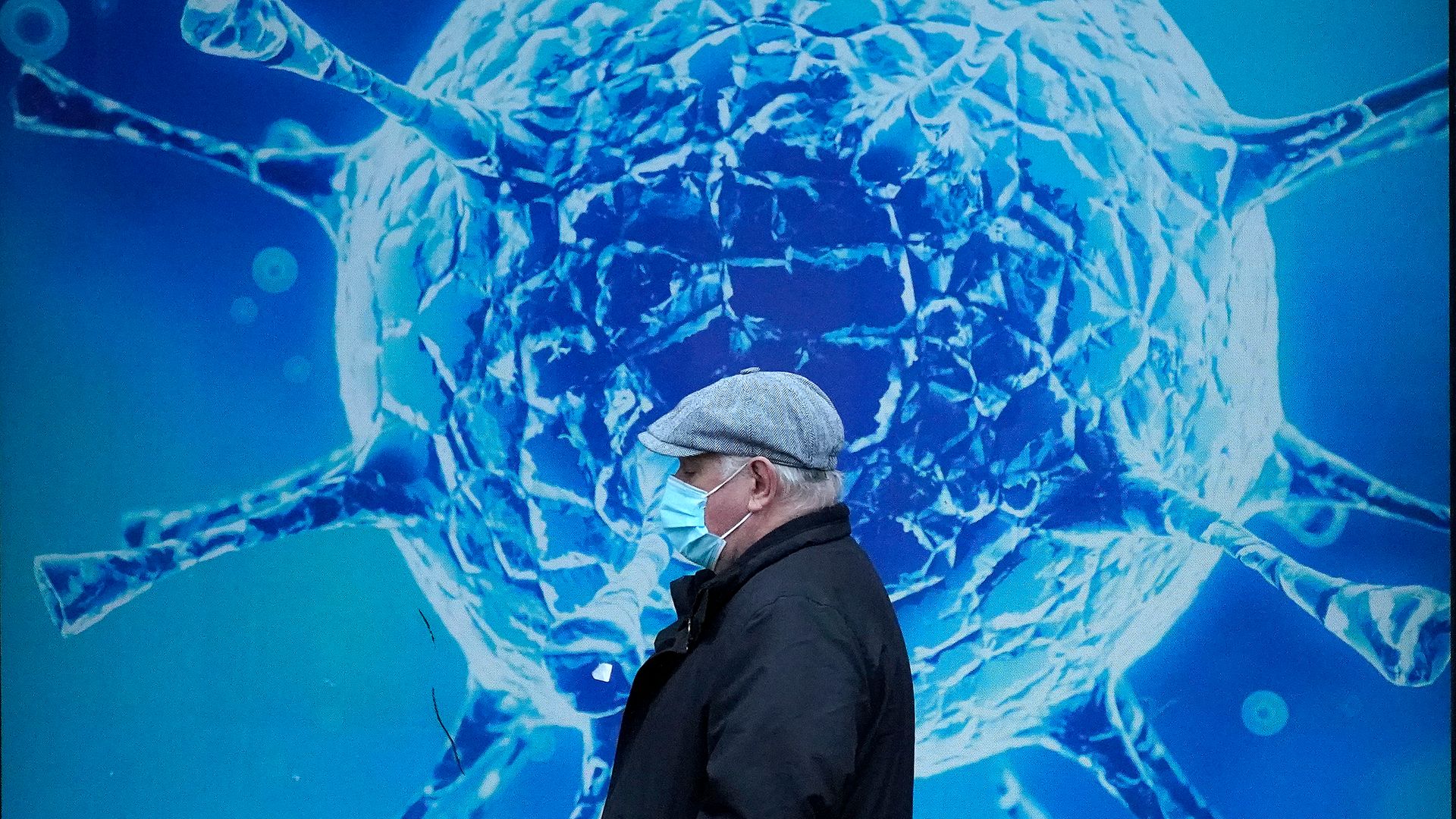
Lack of knowledge about the condition has left Long Covid sufferers desperate and vulnerable to quack treatments.
Kate can’t hear properly. She adds hearing loss to a list of other daily symptoms which include migraines, rashes, tremors and nerve damage. An author and chartered psychologist, Kate is on a waiting list for imaging and other diagnostic tests, and has already undergone three days wearing a heart monitor to rule out potentially fatal conditions like arrhythmia, following chest pain that only resolved after daily exercises with a lung expansion device.
It’s been a year since she had Covid, which she caught at the very start of the first lockdown. She expected to get better after one or two weeks, but instead her symptoms worsened until an ambulance took her to A&E in week five with shortness of breath, chest pain and tachycardia.
Since then, her Covid symptoms have improved but have been replaced with a slew of others, and her ongoing condition is now commonly referred to as Long Covid. She is exhausted, struggles to work, and is afraid she might have to live with debilitating symptoms for the rest of her life.
Kate is one of many people who have ongoing symptoms. There is no diagnostic test for Long Covid, and many sufferers never had a positive Covid test either, as so many got ill before testing was widespread.
They stayed ill, and there is no clear pathway to recovery or treatment. It feels bleak to those who have it, particularly as no-one really knows what ‘it’ is. Most report fatigue, some still have a cough or chest pain while others have daily headaches, muscle pain, hearing or vision problems.
Many report depression, which may be a symptom, or a reaction to the symptoms. Because Long Covid isn’t just one set of symptoms, and because it’s new, it’s difficult to pin down what it is beyond “I got ill and then didn’t get better”.
Attempts to define what might be behind it are a challenge. Ongoing chest pains and coughing is probably the result of lung damage, but that might as easily be classified as ‘more Covid’ rather than ‘Long Covid’. Different symptoms might have different causes, from immune system changes to brain structure, to gut health to metabolism. Some sufferers are now reporting an improvement in symptoms after being vaccinated, which might provide a useful clue as to what is going on, but there is no actual data yet.
The government has released a video warning about Long Covid, not as a call for empathy but as a warning to take Covid itself seriously. Wear a mask, it implies, or you might be in for more than just a bad dose of the flu.
This may work to help with reducing the R number, but it does nothing to reassure people who have Long Covid. “Wash your hands, wear a mask, and keep your distance”, a formerly-active young woman appeals to the camera, “it’s really that simple”. Nothing is said of what happens if you do develop Long Covid, or what the scientific and medical community, let alone the government, is doing about it. Sufferers are afraid.
This has made Long Covid ripe for exploitation by those whose stock in trade is cures for the uncurable. The ‘alternative’ treatments they offer are proven to either not work, or to be dangerous, but in the absence of real medicine and in an online culture where misinformation runs unchecked, snake oil is flourishing.
Fatigue, depression, aches and pains have long been the target of quacks, because those are symptoms which develop with age, and can be a product of stressful lifestyles with poor diets or low exercise, which are harder to fix and therefore demand a tonic or pill to magic everything better.
In 1909, HG Wells wrote a satirical novel called Tono-Bungay about exactly this, long before the age of Gwyneth Paltrow’s wellness Goop or US conservative radio host and conspiracy theorist Alex Jones’s diet supplements and anti-Covid toothpaste. It’s not a new phenomenon by any stretch. In the novel, Tono-Bungay is a wellness tonic sold to cure tiredness, fatigue, brain fog – things that most people experience at some point. Imaginary cures for imaginary diseases have always sold well.
But Long Covid is anything but imaginary, and isn’t the result of sub-optimal lifestyles or not enough water. It’s the result of a very serious virus, and so may well have a potential cure somewhere within medicine.
There are other post-viral illnesses (for example one in ten people who have glandular fever experience lengthy symptoms), but these have been neglected in research or dismissed as only psychological, leaving many sufferers to the mercies of online misinformation, quackery, and wellness gurus who spot a vulnerable and therefore exploitable market.
Long Covid sufferers report spending money on supplements and other dodgy remedies, all the usual alternatives for which there is no evidence. The hashtag is targeted by those selling such treatments, and some report they ‘work’ without knowing if their symptoms would have simply improved anyway. It’s a minefield and a gold rush all at once.
GPs have little better to offer. For years, the recommended treatment for post-viral fatigue and other symptoms was graded exercise therapy, to ‘retrain’ the body back to a normal level of energy, alongside cognitive behavioural therapy. Although this works for some (it did for me following a nasty bout of shingles that left me exhausted for a year), the evidence for it is limited and without more data there’s no way of knowing if patients like me would have got better regardless.
It’s currently not known if Long Covid is caused by the same mechanism as other fatigue illnesses, but sufferers like Kate are concerned they will be left in the same boat: under-funded, under-researched, ignored or even disbelieved.
While GPs are taking Long Covid seriously, waiting lists for tests are long and there is no clear pathway to recovery or useful prescription. Kate’s GP is supportive, and has been careful to first rule out other explanations for her symptoms, but Kate believes “it’s been difficult to make chronic illness a priority while mortality rates, ITU capacity and high case numbers are a concern.
“I am worried that some of the measures apparently being implemented to support us are more a political PR exercise than properly funded, evidence-based care”. What little data there is is difficult to process because it’s self-selecting – that is, data on symptoms from apps like the government’s ZOE platform is limited to those who use the app, and relies on them using it properly.
Without investment and researchers, Long Covid sufferers are left with little but the Tono-Bungay tonics sold by the unscrupulous, or the prospect of a lifetime of symptoms. It feels bleak. But the outlook, I am happy to report, is not. Because Covid, and therefore Long Covid, is such a major threat, money is being thrown at research that would otherwise never have been done.
For example, in the UK £18.5million has been awarded by the National Institute for Health Research for studies into Long Covid. One of these, led by University College London, will help define what Long Covid is and therefore help GPs properly diagnose it. Another study, by Birmingham University, aims to identify which treatments work.
The World Health Organisation has also called for countries to prioritise Long Covid research and rehabilitation, following the speed and success of vaccine development. US institutions are gearing up for Long Covid research after the promise of one billion dollars of funding by Congress.
This pandemic is global, and so are the implications of leaving Long Covid unresearched and untreated, so the effort to collect data and develop reliable, proven treatments will be global too. It may take a while longer, but Long Covid sufferers have reason to be hopeful.
What do you think? Have your say on this and more by emailing letters@theneweuropean.co.uk









